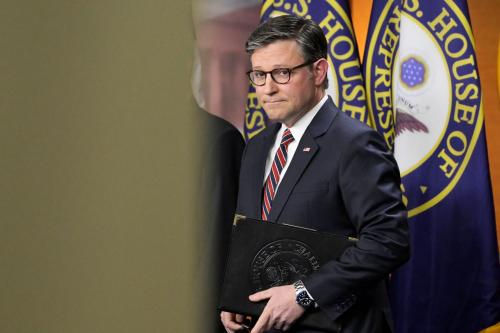Americans are finally according the federal government’s cavernous budget deficit the attention it deserves, and are demanding bold action to reduce it. Right? Well, … let’s see.
Granted, the fiscal fiasco has moved up on the list of leading predicaments that people wish their politicians would (in some sense) address. An NBC News/Wall Street Journal poll last month noted that many more people (20 percent) now rank “the deficit and government spending” well ahead of, say, the supposedly red-hot issue of immigration (7 percent).
Still, the deficit hawks remain a relatively small portion of the public compared to the number of persons who cite, first and foremost, “job creation and economic growth.” Thirty-five percent view this challenge—battling the recession—as the highest imperative (one that implies, if anything, a need for deficit-spending). The results of a Fox News poll taken at about the same time were even starker. It found only 15 percent primarily preoccupied with the deficit and government spending—in contrast to 47 percent saying that, as a first order of business, the government ought to be “working on” the economy and jobs.
That at most just one-fifth of the public currently regards the deficit as “the top priority” may seem underwhelming, but it isn’t surprising. Naturally, when people are asked to identify problems for the government to solve, the list tends to get long, hence rarely can a single item claim more than a plurality of respondents. Besides, just because the deficit is but one of multiple issues jockeying for prominence in the public consciousness doesn’t mean that most of the interested public considers this particular issue unimportant. Indeed, in an especially insightful survey of likely voters taken in March by the Greenberg Quinlan Rosner Research organization for Democracy Corps and Tulane University, fully half of the respondents described the current federal deficit as “a crisis” while an additional 43 percent described it as “a major problem” (though not a crisis). In other words, a combined total of 93 percent expressed a seemingly high degree of concern.
Concern, however, is one thing. Concern so intense as to accept genuine, but alas painful, remedies is quite another. The Greenberg Quinlan Rosner poll, for example, asked likely voters whether they agreed with this statement: “The federal deficit is such a national problem that we might have to raise taxes broadly in ways that will help to bring it down.” Forty-three present concurred, while 51 percent objected. If tax increases fall so short of solid majority support, how then is the deficit to be reduced? Seventy-one percent favored something called “spending cuts” instead. But when the pollsters drilled a little deeper and specified a few such cuts, the vast majority of respondents jumped ship. Sixty-five percent ruled out reductions in Social Security or Medicare—in other words, the preponderance of the government’s outlays.
These findings are consistent with those of other survey-takers. A Quinnipiac poll, also taken last March, reported that an overwhelming percentage (84 percent) of Americans felt that the middle class will have to make financial sacrifices to reduce the budget deficit. Yet, more than three-quarters not only opposed raising income taxes on the middle class but slowing the rate of growth of Social Security and Medicare expenditures.
Why do such attitudes prevail? In part, the pattern reflects an understandable aversion to tax hikes, especially amid bad economic times, and to a loss of entitlements—which is perceived as a breach of the nation’s social contract. But in part, too, there appears to be a fundamental misapprehension about the origins of the fiscal imbalance. For example, while well over a third of the people queried in the Greenberg Quinlan Rosner poll believed that the wars in Iraq and Afghanistan are the principal cause of today’s widening deficit, only a paltry 10 percent blamed the economic recession.
A lesson: Evidently, political leaders need to do a much better job explaining the main sources of the mess we’re in—and leveling with voters about the truly difficult choices it poses.
The Brookings Institution is committed to quality, independence, and impact.
We are supported by a diverse array of funders. In line with our values and policies, each Brookings publication represents the sole views of its author(s).



Commentary
What Do We Really Think About the Deficit?
June 21, 2010